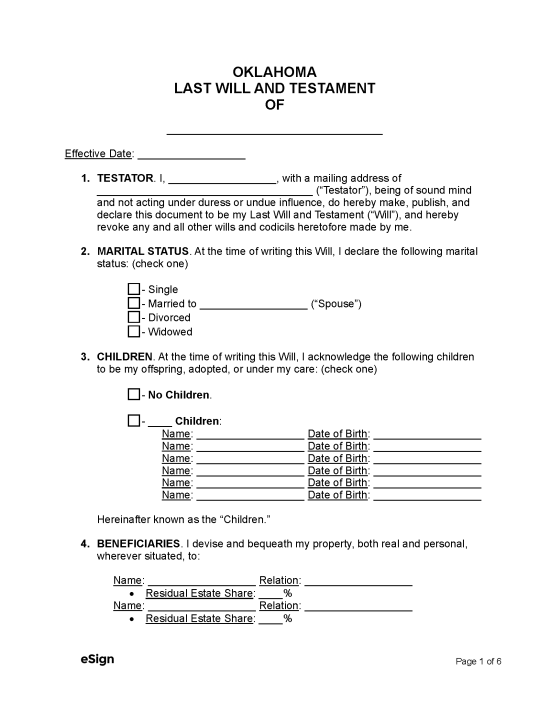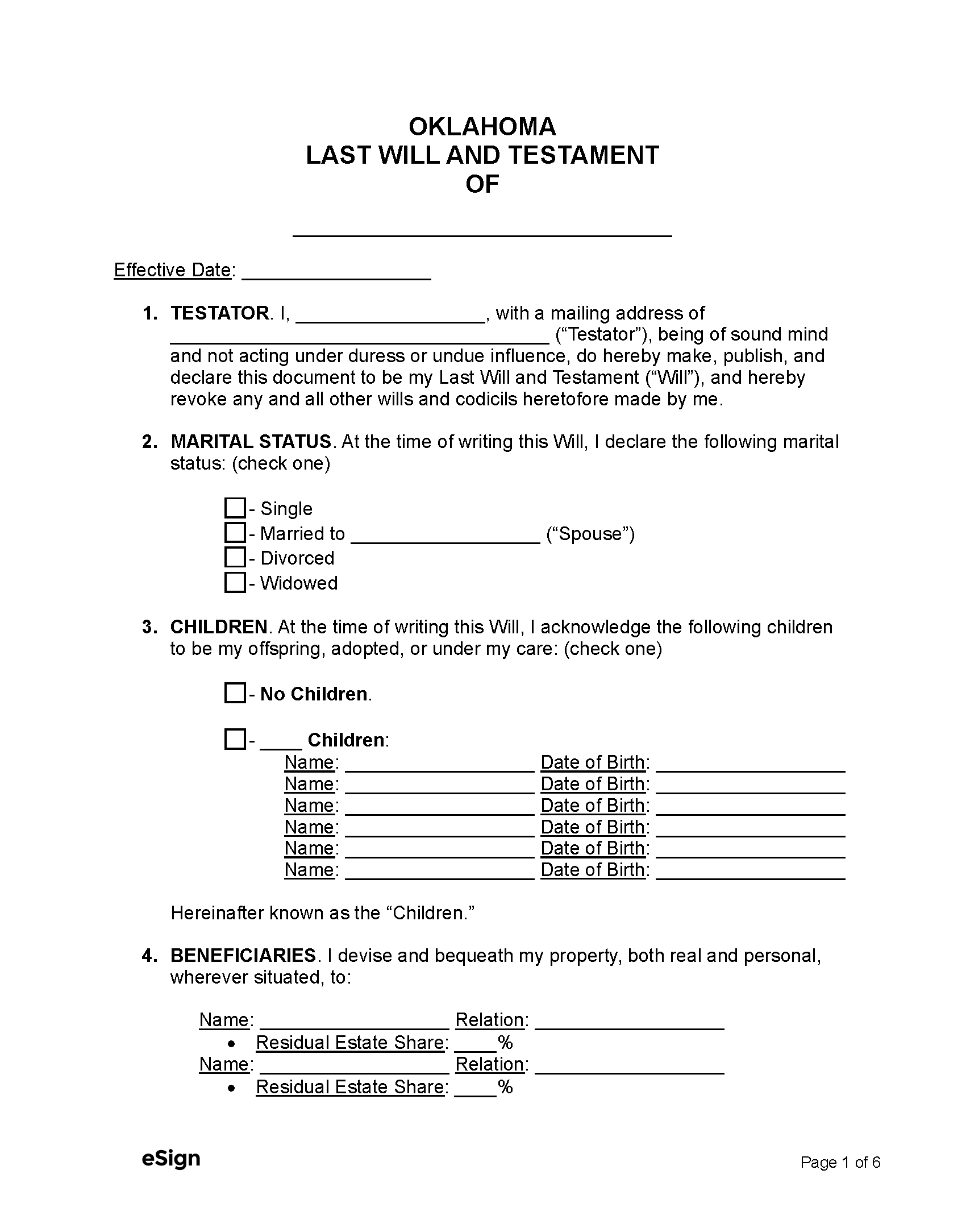An Oklahoma last will and testament allows an individual to define how their assets and property should be distributed when they die. In the document, the person creating the will (the testator) chooses their beneficiaries and appoints an executor to handle the court-supervised administration process. While a will typically assigns a portion of the estate to each beneficiary, there can also be “special bequests” where the testator leaves a particular item for a specific family member, friend, or other chosen party.
Individuals must be at least 18 years old and of sound mind to create a will.[1]
State Laws
Holographic Wills – A holographic will must be written entirely in the testator’s handwriting (no witnesses are required).[2]
Revocation – The validity of a will is revoked if the testator drafts a new will, writes a revocatory statement, or intentionally destroys the original.[3] If the testator’s marriage ends by divorce or annulment, any terms in the will that benefit the former spouse are automatically terminated.[4]
Signing Requirements – A will must be signed by the testator and two attesting witnesses who are present when the testator either signs the will or acknowledges their signature.[5]
Probate Process in Oklahoma (12 Steps)
Before assets can be collected from a deceased person’s estate, the district court will hold a probate proceeding to check the will’s legitimacy and appoint an executor. How long this process takes depends on several factors, such as the size of the decedent’s estate and whether the beneficiaries agree to the settlement terms.
- File Petition for Probate of Will
- Provide Notice of Probate Hearing
- Attend Probate Hearing
- Locate Property
- Give Notice to Creditors
- File Inventory of Assets
- Pay Outstanding Debts
- Sell Property (If Applicable)
- File Tax Returns
- File Petition for Final Accounting
- Make Final Accounting
- Distribute Remaining Estate Assets
1. File Petition for Probate of Will
When an estate is worth $50,000 or less, the decedent’s successors can use a Small Estate Affidavit to collect property without going through probate.[6] Oklahoma also offers Summary Administration, which is a shortened probate process available if any of the following circumstances apply:
- The estate is worth $200,000 or less
- The decedent died more than five years ago
- The decedent lived in another state at the time of death
The procedures for Summary Administration vary from the regular probate process explained below. For specific filing requirements, probate applicants can review Oklahoma’s Summary Administration statutes.
Whoever has possession of the Last Will and Testament is required to provide it to either the district court or the executor within 30 days after learning of the decedent’s death.[7] A Petition for Probate of Will must then be submitted to the court in the decedent’s most recent county of residence, along with the Will (if not already filed) and payment for the fee (roughly $200).[8]
Oklahoma does not provide probate forms for state-wide use. Unless available at the local courthouse, applicants will need to draft their own Petition (see sample for Oklahoma County).[9]
Note: If an executor has been nominated but doesn’t file a Petition within 30 days after learning of the decedent’s death and their own selection as executor, the court may appoint someone else to administer the estate.[10]
2. Provide Notice of Probate Hearing
Once the Petition is filed, the court will schedule a hearing 10 to 30 days after the filing date.[11] Not less than 10 days before the hearing, the petitioner must provide a court-ordered Hearing Notice to the individuals named in the Petition to let them know when the hearing will occur.
Notification Procedures
- Notification by Mail – Copies of the Hearing Notice must be mailed to the last-known address of the executor (if not the petitioner) and each heir, legatee, and devisee.[12]
-
- Using registered or certified mail is recommended, as the court may require proof of service.
-
- Notification by Publication – If the name or address of any party named in the Petition is not known to the petitioner, the Hearing Notice must be published in one issue of a newspaper in addition to being mailed.
-
- Proof of publication should be requested from the newspaper.
-
3. Attend Probate Hearing
During the court hearing, a judge will determine the validity of the decedent’s will and decide whether the executor should be allowed to administer the estate. Proof of mailing or publishing the Hearing Notice will be required if any parties listed on the Petition don’t appear at the hearing.[13]
If the judge approves the filings, they’ll sign an Order Admitting Will to Probate (see Oklahoma County sample) stating that the will is valid. The judge will also issue Letters Testamentary (see Oklahoma County sample), granting the executor permission to administer the estate.
Estate Bond
Executors are generally required to purchase a bond that the State of Oklahoma will hold until the probate process is finished.[14] If needed, the bond must be obtained and presented to the court before the Letters Testamentary are issued.
4. Locate Property
After obtaining the Letters Testamentary, the executor can officially begin administering the estate. Their first responsibility is to gather property owned solely under the decedent’s name. If an asset is jointly owned or already assigned to a beneficiary (e.g., life insurance policy, trust), it won’t be considered part of the probate estate.
5. Give Notice to Creditors
Within two months after receiving the Letters Testamentary, the executor must file a Notice to Creditors stating the final date creditors can present claims against the estate (known as the “presentment date”) and the address where claims should be delivered. The presentment date must be at least two months after filing the Notice to Creditors.[15] If the presentment date falls on a Saturday, Sunday, or legal holiday, it will automatically be rescheduled for the following non-holiday weekday.
The Notice must be published once a week for two consecutive weeks, with the first publication occurring within ten days after it was filed. The Notice must also be personally delivered or sent by first-class mail to all known creditors.[16]
6. File Inventory of Assets
Executors are responsible for making an Inventory that describes the decedent’s property, lists the value of each asset, and indicates which assets are not part of the probate estate.[17] While the executor can perform their own appraisal, the court might find it necessary to order appraisers to determine the value of the estate’s assets.[18]
The Inventory must be submitted to the court no later than two months after the date the Letters Testamentary were issued. Upon filing the Inventory, the executor must also submit a Statement describing all claims presented by the decedent’s creditors.[19]
7. Pay Outstanding Debts
Executors are also obligated to resolve the decedent’s outstanding debts. According to state law, estate debts must be settled in the following order:[20]
- Funeral bill
- Expenses from the decedent’s last sickness
- Family support payments
- Taxes
- Debts with priority under state and federal law
- Judgments (liens and mortgages) upon the decedent’s property during their lifetime
- Valid claims presented within two months after publishing the Notice to Creditors
- All other debts
8. Sell Property (If Applicable)
Assets that are part of the probate estate can be sold to pay off the decedent’s debts.[21] Unless the property will lose value if it isn’t sold immediately, the executor will need the court’s permission before conducting a sale.[22]
The quickest way to obtain permission from the court is to file a petition accompanied by the written consent of every heir, legatee, and devisee. A judge will grant their approval by signing an order, allowing the executor to sell the property without additional court supervision.[23] However, court oversight will be required if not all parties consent to the sale.
9. File Tax Returns
While Oklahoma doesn’t impose estate taxes, a federal estate tax return must be reported if the value of the decedent’s estate is greater than the filing threshold for the year of death. Additionally, an income tax return must be filed with the Oklahoma Tax Commission and Internal Revenue Service to report the decedent’s earnings for the current and prior year (if not filed already).
10. File Petition for Final Accounting
Executors must file a Petition for Final Accounting with the court to request a hearing for the final settlement and distribution of the estate. The hearing date will be set 20 or more days after the Petition for Final Accounting is filed. At least 10 days before the hearing date, the executor must give notice of the hearing to the other parties by:[24]
- Mailing a Notice of Hearing to each heir, legatee, and devisee.
- Publishing a Notice of Hearing once a week for two consecutive weeks in a newspaper issued in the county where the court is located.
The Notice of Hearing must state the decedent’s name, the executor’s name, the hearing date, and that the executor’s accounting is for the final settlement and distribution of the estate.
11. Make Final Accounting
The executor must attend the court hearing to prove the estate is ready for settlement. To accomplish this, they’ll have to provide the court with:[25]
- An itemized list of the money spent and received during the administration process
- The names of the creditors and the amounts of their claims
- Anything else confirming the condition of the estate
If all of the parties entitled to receive assets agree, or if the executor is the sole recipient of property, the court will waive the requirement for the above documents. In this circumstance, the executor may state under oath that the estate is in a proper condition to be closed.
12. Distribute Remaining Estate Assets
After the district court has reviewed the executor’s final accounting and confirmed that all the estate debts have been paid, the executor can ask the judge to issue a Decree of Distribution.[26] The executor may then distribute the remaining estate assets to the beneficiaries according to the instructions left by the decedent in their will.

